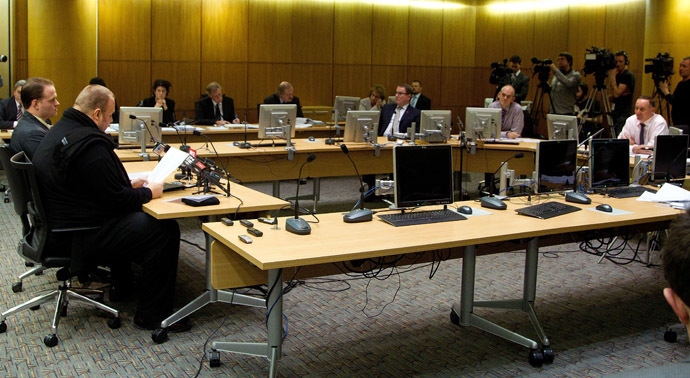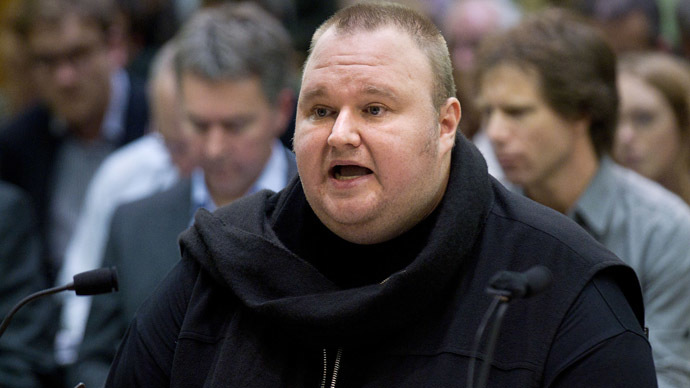Tensions between Kim Dotcom and Prime Minister John Key were raised as the pair sparred at a parliamentary committee hearing on the government’s proposed surveillance law, with Dotcom voicing his opposition to the controversial legislation.
The New Zealand government has proposed a change in the law to
allow the Government Communications Security Bureau (GCJB) to
provide support to the New Zealand Police, Defense Force and the
Security Intelligence Service.
Dotcom was voicing his opposition to the law and was the star of
the show on the second day of hearings of the secretive Security
and Intelligence Committee.
“We should avoid blindly following the US into the dark ages
of spying. In the end, the GCSB is just a subsidiary of the (US)
National Security Agency and the US government calls all the
shots,” he told the committee.
Dotcom went on to urge New Zealanders to repeat their “heroic
stance” of the 1980’s when they declared New Zealand nuclear
free, by rejecting the proposed bill.
“There has never been a greater need for New Zealanders to
once again step forward and declare their values shall not be
abandoned or suspended under pressure from the United
States,” he said.
He also pointed out that the proposed extension of spying powers was “poorly timed considering the scandalous leaks concerning US mass surveillance of the world’s population, including US allies.”
This is the first time the committee, which is being chaired by
John Key the New Zealand Prime Minister, has opened its doors to
the public.
Other concerns
Dr. Rodney Harrison QC, a senior barrister, told the committee
that further details on the extent of the proposed legislation
were needed before it was made law.
“The first and most critical question is, precisely what
activities are to be engaged in by the GCSB. We don’t even know
the answer to this question,” he said.
The government needs 61 votes in order to pass the bill but is
currently one vote short.
Mr Key needs Peter Dunne, an independent MP, to vote for it if it
is to pass, as the Maori Party, the governments other support
partner is unlikely to give its backing.

If Dunne’s vote is not forth coming, Key will have to go to the New Zealand Frist party for support; a small, populist, cross-bench party.
New Zealand’s GCSB is a partner in the so-called
“five-eyes” group, a technical and information sharing
partnership, which is officially called The Technical Cooperation
Program (TTCP) and includes the US, Canada, the UK, Australia and
New Zealand and which is led by America’s National Security
Agency.
Dotcom’s spying claims
Dotcom is being sought by the US on charges of copyright
infringement and money laundering, in connection with his file
sharing site Megaupload.
Dotcom is claiming he has evidence that Key, contrary to repeated
public assurances, had been aware of his activities before a
dramatic raid on Kim Dotcom’s mansion north of Auckland last
year.
Kim Dotcom’s status as a permanent resident of New Zealand meant
the GCSB was not allowed to spy on him. The Prime Minster later
issued a public apology over the incident.
“Abuse of spying powers is not limited to national security
matters. The GCSB was involved in the raid on my home to support
an alleged breach of copyright, it has nothing to do with
terrorism or national security,” he said.
“Oh he knew about me before the raid, I know about that. You know I know,” said dotcom staring straight at Key.
“I know you don’t know. I know you don’t know,” the Prime Minster replied.
“Why are you turning red, Prime Minister?” Kim quipped
back.
“I’m not. Why are you sweating?” said Key.
“It’s hot. I have a scarf,” said Kim.
After the hearing Kim told the New Zealand TV3 Campbell live program, while grinning at the camera, “I do not know Edward Snowdon personally, that’s all I want to say about this.”
Key later told reporters that Kim was “a well-known conspiracy
theorist. He’s utterly wrong.”

